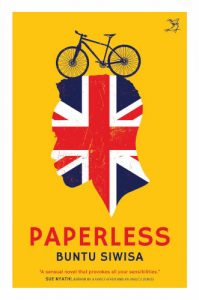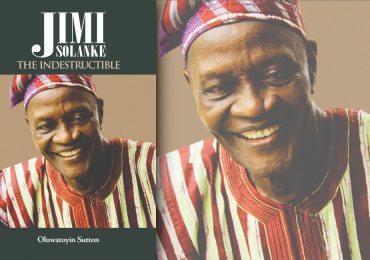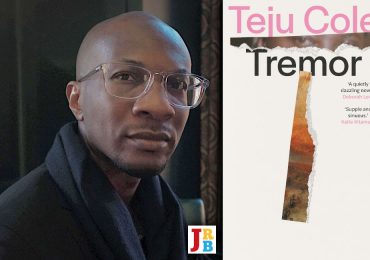The JRB presents an excerpt fom Paperless by Buntu Siwisa.

Paperless
Buntu Siwisa
Jacana Media, 2023
One
I was on my way to see Ian Smith. For twenty pounds, I was going to see the last white prime minister of Zimbabwe. His name had been sizzling under my breath the whole day. And I couldn’t decide whether I was excited or uneasy or nervous or appalled—or pretending to feel some or all of these things. But why? Was it that I was about to come face to face with the man who had vowed that ‘not in a thousand years’ would Zimbabweans rule themselves? Or was it that for once—for once, that night—Africa was not going to jive on the outskirts of Oxford? That Africa was not going to be relegated to Area Studies? Why did I care anyway?
And why was I there? I had asked myself that two years back, rolling my luggage out of Heathrow Terminal One to catch a seventy-minute bus ride to Oxford. Taking my first step on English soil, I had looked around and wondered: Do I really need to be here? For this? For this long? Do I need to be here in order to write a doctoral thesis about the politics of a South Africa I had left behind? What was it that this England could offer me that South Africa couldn’t? And now I had paid twenty pounds—two tenners, or four fivers—to meet my neighbour almost eleven hours by plane, far away from our homes.
Why did it matter that we all had to be there? Were we summoned by some absent father? I could not let go of that feeling of a child acting, hopping about in theatrical bounds. That child, tugging at the jacket of his father, gasping for his attention, of a father looking elsewhere. Or perhaps I had long stopped caring about the properness of these things. ‘Solsbrry, not Salisbheri!’ Long ago, Mama—my grandmother—had jumped at how I had bastardised the whole affair of pronouncing the name of the capital city of a Rhodesia dead for a long time even then.
And for twenty quid, at the Oxford Union, I was going to watch Ian Smith stand before us, debating: Do African leaders govern for, or against the interests of their people? But we all quietly knew that the Oxford Union was gunning for the old boogeyman RG: Gushungo, Karigamombe, Comrade, First Secretary, Commander-in-Chief, His Excellency President Robert Gabriel Mugabe. Even lashing out at the back of the shadow of the Big Bad Wolf serenely sipping on tea with his dearest Grace down in Harare was going to suffice. That was all there was to it.
Anyway, all the black people in Oxford—the whole lot of them—were coming to see Ian Smith. We had been talking about this for the entire Michaelmas term, all through autumn. It was strange that we had said very little, and knew almost nothing about the rest of the Zimbabwean delegation—Margaret Dongo and other celebrated opposition leaders. Ian Smith. That old, fragile Ian Smith—I imagined him.
‘Ian Smith.’ I tossed out his name in a hissing lungful. Perched on my blue mountain bike on Magdalen Street, his name did a roundabout zing through my helmet. Zimbabwe had been on my mind a lot those past few weeks. But I wanted her gone. I wanted to stop thinking about Zimbabwe, about my father, who had been exiled from there. I had just managed to push aside flashbacks of a horseshoe-shaped library fast catching fire when my mother broke the news. ‘Double pneumonia.’ My mother’s voice did not break over the phone three weeks back. It had not been sad. It had not been happy. The man was dead.
The man died, my mother had said. ‘The man died’—that telegram had come to Wole Soyinka. Cryptically, it told him of what had happened to the disappeared fellow inmate he had enquired of shortly after his release from prison. The Man Died. In reading Soyinka’s prison writings, I recalled weighing the many deaths, dying small and vanishing big. And I had measured my father’s death—how little I had died, the vastness of my death. I turned my mind off from dying men. I forced myself to stop mourning for a man I had only seen once in my entire life following his return from exile.
I waited for the traffic lights to change. Riding past the blue Borders bookshop and opposite the three-storey brownstone Waterstones bookshop, I made a mental note to buy Miles Davis’s biography. Traffic lights flipped colours to the spell of rush-hour traffic. Looking across, the crowd milled and crunched and galloped around the NatWest building on the corner of George and Cornmarket streets. Tourists—Americans, Russians, Chinese—and Eastern European students streamed in and out of the long red-and-orange and blue-and-green-and-yellow musical touristy Cornmarket. It was a pedestrians’ and cyclists’ street, edged by small department stores, music shops, nightclubs down alleys, fast-food joints, cellphone and computer shops.
With the traffic lights in my favour, I pedalled on, turning right onto George Street. Slicing through the frenzied crowd, I passed the double-storey Debenhams department store. I had been there a few times last summer, to buy myself some discounted Levi jeans, shirts and shoes. Then came the large glass-adorned Bella Pasta and the orange-and-black New Orleans restaurant. I rode on the pavement, avoiding a black cab slowly chewing through the traffic.
Cycling through the traffic, the ‘brilliant but impatient’ Kwame Apollo-Gyamfi hurried his way into my mind. He was an Oxford Ghanaian student character in Kenyan Professor Ali Mazrui’s weak (and only) novel, The Trial of Christopher Okigbo, fatally run over by a car while cycling through Oxford’s traffic. Then he went to heaven to litigate in the trial of the legendary Nigerian poet who died fighting in the Biafra War.
A lanky blond wino in dirty, faded blue jeans and a black jacket, holding on to an opened can of Stella Artois, staggered in front of me outside the NatWest building. I rang my bicycle bell, and the crink-crink-crink petered out in a furious staccato.
‘Shut up, you wanker!’ the wino yelled as I zigzagged past him. And I watched him grabbing his crotch, mimicking pitiless masturbation.
‘The madness of George Street.’ The words spaced themselves out through the gap in my pair of upper front teeth. I felt my dimples sharply gorging inside my cheeks, listening to my words doing the rounds inside my helmet.
‘Every soul on George Street is a scintillating novel gagging to be penned.’ I listened to the stabs of laughter wriggling inside me and then tumbling out. My body jerked, almost trembling to a short spark of joy. I looked to my left and right, and behind, searching for that spark of joy. It had vanished as fast as it had turned up, mingling and disappearing in the grinding crowds.
I hadn’t laughed for over two months. First it was Mama, who had longed to see me graduate with my doctorate in Politics and International Relations. A chunk of my innocence had gone down with her as I watched the earth taking in her casket. Then it was my father, a man I had hoped to see for a second time, maybe even a third. And again and again, the way sons see their fathers to a ripe old age. Then another publisher rejected Ours, my manuscript. And it had not been long since Amanda from Iowa had dumped me. I pedalled on slowly, and stopped next to the pavement across from a small newsagent. A Lebanese flag was hoisted above the shop door, next to a lottery advert.
‘Yebo!’ I yelled at Dela Owusu—slim and tall, dressed in a well-cut charcoal suit and a navy turtleneck sweater. A black scarf swirled around his neck. His long black jacket flapped gently at his sides. He continued up George Street, holding on to a fresh ten-packet of Marlboro Lights. Under his arm dangled a folded copy of The Guardian.
‘Yebo!’ I shouted again.
Dela walked on.
‘Dela.’ I hurled out his name.
He stopped, looking back.
‘Luzuko.’
~~~
- Buntu Siwisa is a senior researcher at the Southern Centre for Inequality Studies (SCIS) at Wits University. His most recent book, Rugby, Resistance and Politics: How Dan Qeqe Helped Shape the History of South Africa was published in 2022. Paperless is his debut novel and was shortlisted for the James Currey Prize for African Literature.
~~~
Publisher information
‘A fascinating novel written in the shadow of Dambudzo Marechera, about Africans, and South Africans, hating and loving Oxford.’—Imraan Coovadia, author of The Wedding and Tales of the Metric System
‘Paperless is a voyeuristic journey through the lives of an eclectic ensemble of unforgettable characters. Siwisa skilfully interweaves their poignant stories through evocative images peppered with comical wit. With precision, he probes the politics of being African, black, undocumented and displaced in the lily-white streets of Oxford. A sensual novel that provokes all your sensibilities.’—Sue Nyathi, author of A Family Affair and An Angel’s Demise
Luzuko Goba, a South African studying at Oxford, navigates the worlds of the undocumented, and the people living on the margins of life in Oxford, England.
His father, a former political exile, has just died, and Luzuko is weighing up his father’s life of sacrifice and the price they both paid for freedom back home.
This is a book about wayfarers, out of time, and on the wrong side of the UK’s department of immigration. They are the paperless.
Sweeping and soulful, Buntu Siwisa observes the hidden and exceptional modern lives of migrant Africans in England in this beautiful debut.





